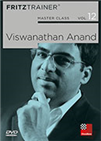"This win is indeed very special for me"
Press release by FIDE
After nine long and tremendously exciting rounds, the Cyprus Women's Grand Prix has come to a close. The final round was highly entertaining, despite all five games ending in draws. In fact, the final tournament winner, Anna Muzychuk, was only decided at the very end, based on a unique combination of factors.
Zhu Jiner failed to convert what seemed like a big advantage against Nana Dzagnidze while, at exactly the same time, Olga Badelka was unable to finish off a decisive +12 advantage against Stavroula Tsolakidou.
 This DVD allows you to learn from the example of one of the best players in the history of chess and from the explanations of the authors how to successfully organise your games strategically, and how to keep your opponent permanently under pressure.
This DVD allows you to learn from the example of one of the best players in the history of chess and from the explanations of the authors how to successfully organise your games strategically, and how to keep your opponent permanently under pressure.Both Anna Muzychuk and China's young prodigy Zhu Jiner scored solid 2600+ performances and tied for first on 6/9, leaving behind Harika Dronavalli, Aleksandra Goryachkina and Mariya Muzychuk at a one-point distance in the final standings.
Anna will take home the trophy and winner's recognition, but the prize money and WGP circuit points will be shared with Zhu Jiner.

Anna Muzychuk
After the closing ceremony, Anna shared her thoughts with the FIDE Press Officer:
I am very happy that I won the event: the last time I shared first place in a tournament was thirteen years ago, so this win is indeed very special for me. For that, I would like to thank the organization for creating good conditions for the player and, of course, everyone that helped me to achieve it.
Regarding her chances to win one of the two spots in the next edition of the Women's Candidates, Anna was quite down-to-earth:
Obviously a win in this tournament increases my chances to qualify, but everything is still very unclear. I will try to prepare well for Austria and just hope that things will go well for me.

Let's take a closer look at yesterday's playing session.
Round 9 results
Mariya Muzychuk ½–½ Aleksandra Goryachkina
The first game to finish exhibited excellent home preparation by both players. Facing her opponent's Berlin Defence in the Ruy Lopez, Mariya chose a line that's well-known for being very drawish at the highest level, although every now and then White is able to score a win.
However, Goryachkina, who has always been exceptionally well-prepared in the opening, sidestepped any potential dangers. Maybe 28.Kh2 instead of 28.Qc3 might have been a way to keep things going for White, but after the exchange of queens the position ultimately liquidated into a clearly drawn rook endgame.
 The Neo-London System offers many new, creative possibilities to present your opponents with serious problems in the early stages of the game.
The Neo-London System offers many new, creative possibilities to present your opponents with serious problems in the early stages of the game.To top things up, the accuracy score displayed was uncanny: 99%!
With this result, both players finished with a solid, undefeated +1 score (eight draws and one win). For Goryachkina, she picks up some useful Grand Prix points in her third and last leg of the cycle, giving her excellent chances to qualify for the Women's Candidates Tournament.

Mariya Muzychuk
Elisabeth Paehtz ½-½ Divya Deshmukh
The German grandmaster, who has manifested publicly that Cyprus will probably be her last official classical tournament, opened the game with the London System. In response, Divya opted for a lesser-known line, but which has been tried out by some of the best players in the world, including Magnus Carlsen.
After fifteen moves, the position was totally blocked and there didn't seem to be much going on. However, at one point, Divya offered the exchange of queens, which wasn't accepted by Elizabeth, and the game immediately ended in a draw by move repetition.
Understandably, Paehtz just wanted to end the tournament as soon as possible, but the ending suggests that after the exchange of queens she would have had a sizeable advantage. Divya finishes the event very slightly under expectation but takes away a huge learning experience in her journey to the top.

Divya Deshmukh
Harika Dronavalli ½-½ Anna Muzychuk
Both players have a long playing history together: 18 games, with 14 draws and 3 wins for Harika – a slight statistical edge. They have been playing since they were kids – their first official game was in Spain, at the U-10 Oropesa del Mar World Championship in 2000, exactly twenty-five years ago!
Ultra-solid, Harika was looking for a risk-free edge in her game today, knowing very well that the pressure was on her opponent: Anna needed at least a draw to remain in contention for first place.
Intending to unbalance the game, Anna went for the slightly unusual but playable 5…Nh6 variation in the English Agincourt, an idea tried out by Gukesh's second Gajewski in 2022.
 This course will enhance your understanding of the King’s Indian Defence. Perfect for anyone looking to improve their opening strategy, reduce mistakes, and develop a winning game plan.
This course will enhance your understanding of the King’s Indian Defence. Perfect for anyone looking to improve their opening strategy, reduce mistakes, and develop a winning game plan.Caught by surprise, Harika played it safe and traded queens, but White had no advantage in the queenless middlegame.
After more piece trades, a draw was agreed in a completely equal rook ending on move forty: Harika had an extra pawn but no way to progress. Once again, accuracy levels of 99% indicate the extremely high level of precision in this game.

Harika Dronavalli
Olga Badelka ½-½ Stavroula Tsolakidou
"I was so lucky", a happy Stavroula told me immediately after the game. "I was completely lost if she had played 36.Qg5, I think I would have been mated in a few moves". Badelka missed a golden opportunity to score her second win in the event.
The game began with the ceremonial move performed by Mr. Evros Stylianou, General Manager of the magnificent Hilton Nicosia, the perfect venue for an elite round-robin chess tournament.
The former Belarusian player, now representing Austria, played a great attacking game, and totally outplayed Tsolakidou in a fashionable line of the King's Indian Defence. But just when she was probably expecting Stavroula to resign, Olga missed her chance to score.
Moment of the day
Badelka would have taken the point home had played here 36.Qg5! with decisive checks on e5 or f6.
Instead, she went 36.Qe4 and after 36…Qe7! she realized that things were not so simple as 37.fxe5 runs into 37…Qxa3 (diagram), and it's a mess.
Even after the miss, the engine still gives Badelka a decisive advantage, but it's always tricky to bring it home after realizing you let go of a winning opportunity.
Stavroula started to defend perfectly and after trading queens, transitioned into a rook ending, down a pawn. And as the saying goes, "All rook endings are drawn!"

Olga Badelka
Zhu Jiner ½-½ Nana Dzagnidze
Tied for first, and aware that Anna Muzychuk had drawn her game against Harika, the young Chinese prodigy Zhu Jiner did her utmost to defeat Nana Dzagnidze, to the point of playing out a rook v. three passed pawns ending.
But Nana's defensive skills, once again put to the test, were up to the challenge. She clocked in an unbelievable 97% accuracy score, which, considering the complexity of the game, is absolutely uncanny.
 From Mating with a queen; a rook; two bishops; a knight and a bishop; to the basics of pawn endgames – here you will gain the necessary know-how to turn your endgame advantages into victories!
From Mating with a queen; a rook; two bishops; a knight and a bishop; to the basics of pawn endgames – here you will gain the necessary know-how to turn your endgame advantages into victories!"Was it equal all along?" Zhu Jiner asked me immediately after finishing the game. She was sure that she had missed a win at some point. In any case, finishing in shared first place and getting the same prize money as Anna Muzychuk is an excellent result, especially taking into account that this is her first of three tournaments in the cycle.

Zhu Jiner
Standings
All games
Links
























